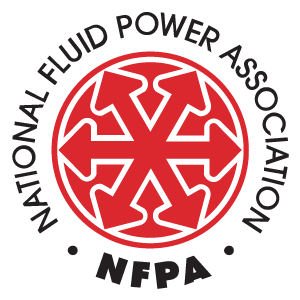The NFPA Technology Roadmap identified a number of machine-level technology trends that are actively shaping the future of the fluid power industry. These trends include the increasing electrification, connectivity, and autonomous functionality of both the mobile and industrial machines that use fluid power in their power or control systems.
To better understand these trends, and to engage stakeholders across the supply chain in the development of the resources and connections that will be needed to keep fluid power positioned at an actuation technology of choice on all these platforms, NFPA launched two Technology Task Forces – one focused on mobile applications, and the second focused on industrial applications.
These task forces held their first meetings in September 2023 – both held virtually and both focused on identifying the critical value points for fluid power, i.e., ideas, content areas, or challenges that represent spaces likely to draw stakeholders from across the value chain together for mutual learning and benefit. A recap of these value points is included at the bottom of this article.
Now, we are actively looking for more OEM engineers from key fluid power customer companies to join these task forces and help develop the value points into programs of interest to the fluid power industry and its customers. NFPA members are encouraged to extend an invitation to their customers to join these task forces, with all referrals directed to Eric Lanke at elanke@nfpa.com for more information and/or confirmation.
The next meetings of the task forces are being scheduled now for early December 2023, and we would very much like to include many more OEM engineers in those discussions.
+ + +
Critical Value Points for Fluid Power – Identified by the NFPA Mobile Technology Task Force
Rapid Prototyping; including:
- Reducing fluid power product design cycles and speed time to market.
- Reducing fluid power product design and production costs.
- Designing fluid power products for additive manufacturing (e.g., with embedded capabilities and technologies that align with primary customer strategies of electrification, connectivity, and autonomous functions).
Electrification; including:
- Improving thermal management of electrified machine systems.
- Determining technology breakpoints (i.e., pros/cons of fluid power vs. electromechanical actuation and when to best use each technology on an electrified machine).
- Extending battery life, especially by increasing the efficiency of hydraulic systems.
- Improving designs for hydraulicly-actuated, battery- or electric-hybrid-powered machines.
- Reducing noise (volume and harshness) of hydraulics on quieter electrified machines.
Connectivity; including:
- Using data generated by fluid power systems to perform prognostics and preventative maintenance.
- Designing fluid power products for connected machine architectures and systems.
- Securing and effectively using machine and system data in edge environments.
- Connecting fluid power systems through prevalent machine CAN bus systems.
Autonomy; including:
- Reviewing and updating functional safety requirements for autonomous fluid power systems.
Critical Value Points for Fluid Power – Identified by the NFPA Industrial Technology Task Force
Education on Current Capabilities
It was generally agreed that when it comes to use of connected data and systems for automated functions and other value-added services, fluid power in industrial applications is well advanced and capable of meeting most customer demands, especially when compared with fluid power in mobile applications. It was also agreed that although some customers “get this,” many more do not, indicating a need for broadly educating the market on these capabilities, the efficiency and productivity gains that they can enable, and the positive aspects of their cost/benefit analysis.
Exploration of New Capabilities
It was also generally agreed that, as advanced as connected industrial fluid power may be, there are areas and opportunities for improvement, and that these areas could serve as connection points for technologists across the fluid power value chain. These areas may include:
- Preventive and predictive maintenance. Use of data to understand when components/systems are nearing failure.
- Smarter systems. Fluid power systems that learn and adjust while operating.
- Increasing efficiency. Using data to create more efficient systems.
- Increasing productivity with more data-driven/automated systems, especially in response to a decreased availability of skilled operators.
- Safety. How to make automated fluid power systems safer and easier to use.
- Data sharing, security and display. Need to drive data back to the operator in user-friendly ways, while addressing issues with data sharing and ownership across multiple systems.
Exploration of New Technologies and Architectures
In addition to these developmental areas for connected industrial fluid power, several other new technologies and architectures were identified as possible connection points for technologists across the fluid power value chain. These areas include:
- Smaller, distributed systems, delivering autonomous power at each point of actuation. Eliminating some of the piping and large power generation at a central source.
- Use of alternative fluids or materials.
- Designing fluid power products for additive manufacturing (e.g., with embedded capabilities and technologies that align with primary customer strategies of electrification, connectivity, and autonomous functions).
Like this post? Share it!
Recent Posts
Fall 2024 Fluid Power Recruitment Event with NIU
RSVP for our Fall 2024 Fluid Power Recruitment Event with Northern Illinois University (NIU). NIU is one of seven universities recognized as a Power Partner, teaching fluid power competencies and engaging in all NFPA educational programs. At this event, your company will have the opportunity to connect directly with NIU engineering students. Engaging in meaningful conversations,…
Now Announcing: Cuyahoga Community College as a Fast Track Hub in Ohio
NFPA’s Fast Track to Fluid Power is a workforce development pathway that partners local technical colleges with fluid power industry members and high school teachers. These networks create awareness and interest in fluid power and train students along a path that leads to careers in fluid power at NFPA member companies. We are pleased to…
Now Announcing: Houston Community College as a Fast Track Hub in Texas
NFPA’s Fast Track to Fluid Power is a workforce development pathway that partners local technical colleges with fluid power industry members and high school teachers. These networks create awareness and interest in fluid power and train students along a path that leads to careers in fluid power at NFPA member companies. We are pleased to…



